Your refrigerator water may come out slow due to a clogged water filter or a low water pressure issue. When your refrigerator water comes out slow, it is usually caused by either a clogged water filter or a low water pressure problem.
A clogged filter restricts the flow of water, resulting in a slower stream. On the other hand, low water pressure can also cause a slow flow of water. It is important to check, clean or replace the water filter regularly to ensure proper water flow.
Additionally, ensure that the water supply valve is fully open and that there are no kinks in the water supply line. By addressing these possible causes, you can fix the slow water flow in your refrigerator.
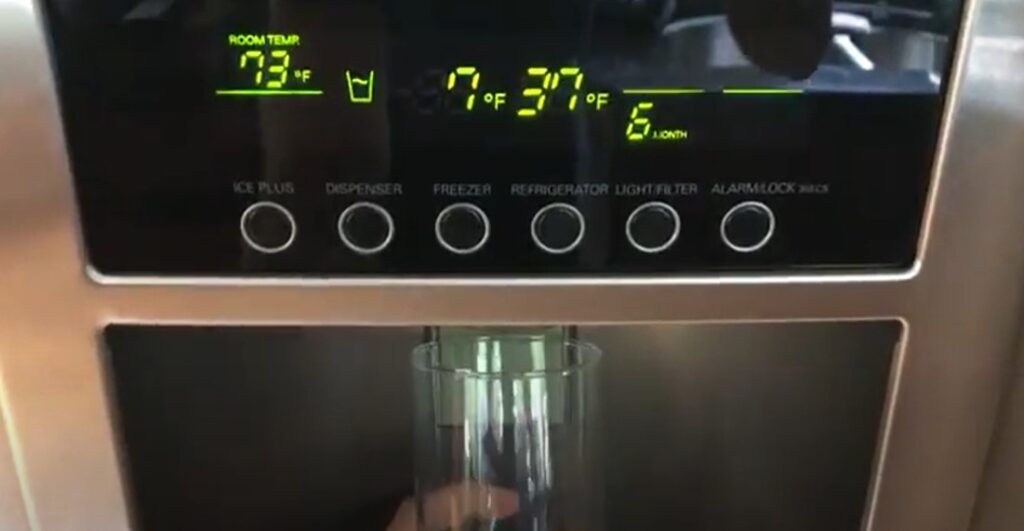
Common Causes Of Slow Water Flow In Refrigerators
Poor water flow in refrigerators can be caused by various factors, such as clogged water filters, low water pressure, kinked water lines, or malfunctioning water valves. These issues can lead to frustratingly slow water flow from your refrigerator dispenser.
Is your refrigerator water flowing slowly? This can be a frustrating problem that affects your daily routine. Fortunately, there are several common causes for this issue that can be easily resolved.
Let’s take a closer look at these common causes and possible solutions:
Clogged Water Filter:
- If your refrigerator’s water filter is clogged, it can restrict the flow of water. This is a common issue that can be easily fixed by replacing the old filter with a new one.
- Check your refrigerator’s manual or manufacturer’s website for specific instructions on how to replace the water filter. Each refrigerator model may have a slightly different process.
- Regularly replacing the water filter every six months (or as recommended by the manufacturer) is essential to ensuring proper water flow and maintaining water quality.
Low Water Pressure:
- Another common cause of slow water flow is low water pressure. This can happen when the main water supply to your refrigerator is not adequately pressurized.
- Check if other appliances in your home, such as faucets or showers, also have low water pressure. If so, the issue may be with your home’s plumbing system rather than the refrigerator itself. Consider contacting a professional plumber to inspect and address the low water pressure issue.
- On the other hand, if only your refrigerator is experiencing low water pressure, check if the water supply line is kinked or twisted. Straightening the line can help improve water flow.
- It’s also important to ensure that the shut-off valve supplying water to your refrigerator is fully open. Sometimes, the valve may be partially closed, restricting water flow.
Frozen Water Line:
- If your refrigerator’s water line freezes, it can lead to slow or no water flow. This issue commonly occurs in refrigerators with freezer compartments.
- Check if the temperature in your freezer is set too low. Adjusting the temperature slightly higher can prevent the water line from freezing.
- If the water line is already frozen, you can defrost it by turning off the refrigerator and allowing it to thaw naturally. This process may take a few hours. Alternatively, using a hairdryer on low heat can speed up the thawing process.
- To prevent future freezing, ensure that the refrigerator’s temperature is set correctly and that the freezer door is properly sealed.
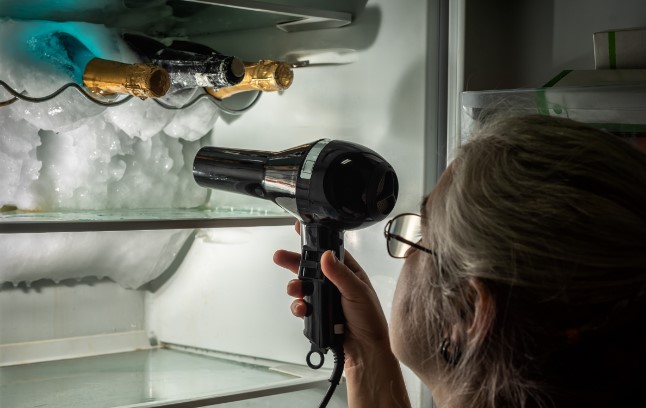
By understanding these common causes of slow water flow in refrigerators, you can troubleshoot and resolve the issue quickly.
Whether it’s a clogged water filter, low water pressure, or a frozen water line, there are simple steps you can take to ensure a smooth and steady flow of water from your refrigerator.
Troubleshooting Slow Water Flow Issues
Is your refrigerator water flowing slower than usual? Find out the possible reasons behind this issue and troubleshoot it effectively for a quicker flow of clean and refreshing water. Keep your fridge running smoothly with these helpful tips.
Is the water from your refrigerator dispenser coming out at a snail’s pace? Don’t worry, we’ve got you covered. Follow these simple steps to troubleshoot and address slow water flow issues in your refrigerator.
Step 1: Check The Water Supply
Ensure adequate water pressure:
- Check if the water pressure in your home is sufficient for your refrigerator’s water dispenser. Low water pressure can lead to slow flow issues.
Inspect the shut-off valve:
- Locate the shut-off valve behind your refrigerator and ensure it is fully open. A partially closed valve can restrict water flow.
Step 2: Examine The Water Filter
Replace or clean the filter:
- If your refrigerator has a water filter, it could be clogged with impurities over time. Replace the filter regularly as recommended by the manufacturer, or clean it if it is a reusable filter.
Check for clogs or leaks:
- Inspect the filter housing for any clogs or leaks that may be obstructing water flow. Clear any blockages and fix any leaks.
Step 3: Inspect And Thaw The Water Line
Locate the frozen section:
- Frozen water lines can cause reduced water flow. Identify the section of the water line that may be frozen, typically near the back of the refrigerator.
Thaw the line safely:
- Gently thaw the frozen water line using a hairdryer or by manually defrosting the refrigerator. Be cautious while thawing to avoid damaging the line.
Step 4: Assess The Water Inlet Valve
Test the valve for proper functionality:
- The water inlet valve controls the water flow to the dispenser. Use a multimeter to check if the valve is functioning correctly. If not, it may need a replacement.
Replace if it is malfunctioning:
- If the water inlet valve is faulty, you may need to replace it. Consult your refrigerator’s manual or reach out to a professional for assistance.
Step 5: Consider The Refrigerator’s Temperature Settings
Adjust the temperature to prevent freezing:
- Improper temperature settings can lead to frozen water lines. Adjust the refrigerator’s temperature settings to ensure optimal cooling without freezing the water line.
Ensuring optimal cooling efficiency:
- Make sure your refrigerator is always set at the recommended temperature to guarantee efficient cooling and prevent water flow issues.
By following these troubleshooting steps, you can identify and resolve the underlying causes of slow water flow from your refrigerator dispenser. Enjoy refreshing water with ease once again!
Fridge Water Coming Out Slow
There are a few possible reasons why your fridge water might be coming out slowly:
- Clogged water filter: This is the most common cause of a slow water dispenser. Water filters need to be replaced every 6 months, or sooner if you have hard water or use a lot of water from the dispenser.
- Kinked or damaged water line: The water line that connects your fridge to your water supply can also become kinked or damaged, restricting the flow of water.
- Low water pressure: If your overall water pressure is low, it can also cause your fridge water to dispense slowly.
- Frozen water lines: If your fridge is in a cold location, the water lines may freeze, preventing water from flowing to the dispenser.
To troubleshoot the problem, try the following:
- Replace the water filter. If it’s been more than 6 months since you replaced the water filter, start by replacing it. This is a quick and easy fix that often solves the problem.
- Inspect the water line. Check the water line that connects your fridge to your water supply for any kinks or damage. If the line is kinked, try to straighten it out. If the line is damaged, you’ll need to replace it.
- Check your water pressure. If you’re still having problems, check your overall water pressure. You can do this by running a tap at full blast. If the water comes out slowly, you may need to contact your water utility company to have your water pressure adjusted.
- Defrost the water lines. If your fridge is in a cold location and the water lines are frozen, you’ll need to defrost them. You can do this by turning off the water supply to the fridge and using a hair dryer to thaw the frozen lines.
If you’ve tried all of the above and your fridge water is still coming out slowly, you may need to contact a qualified appliance repair technician.
Additional tips:
- If you’re not sure how to replace the water filter or inspect the water line, consult your fridge’s owner’s manual.
- If you have low water pressure, you may want to consider installing a water pressure booster pump.
- If you live in a cold climate, you may want to insulate your fridge’s water lines to prevent them from freezing.
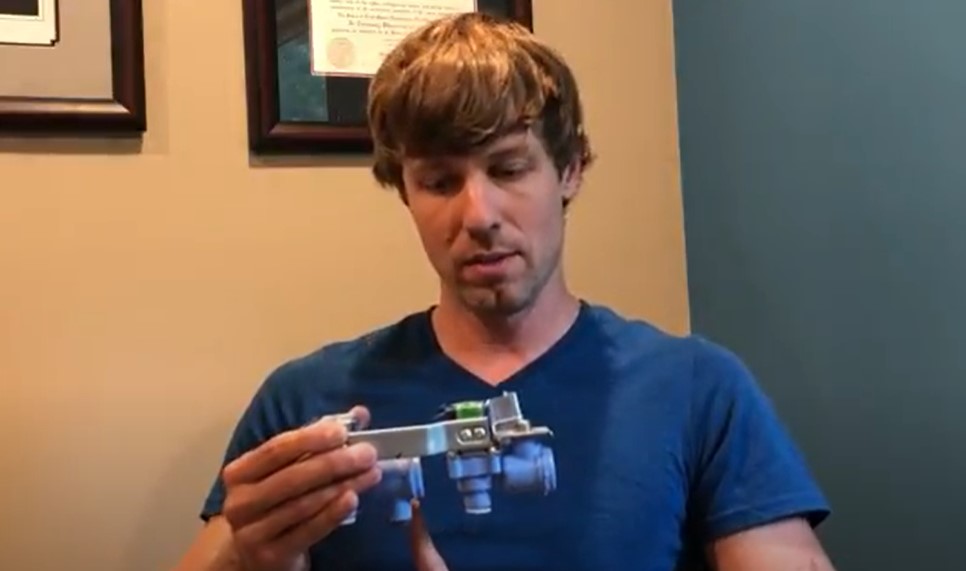
How to fix slow water flow in refrigerator?
To fix slow water flow in a refrigerator, you can try the following:
- Replace the water filter. The water filter is one of the most common causes of slow water flow in refrigerators. Water filters should be replaced every 6 months, or sooner if you have hard water or use a lot of water from the dispenser.
- Check the water line. Make sure that the water line that connects your refrigerator to your water supply is not kinked or damaged. If the water line is kinked, try to straighten it out. If the water line is damaged, you will need to replace it.
- Purge the water system. Air bubbles in the water system can also cause slow water flow. To purge the water system, simply run the water dispenser for 2-3 minutes.
- Clean the dispenser nozzle. Mineral deposits and other debris can build up on the dispenser nozzle, restricting the flow of water. To clean the dispenser nozzle, remove it and soak it in a vinegar solution for 15-20 minutes. Then, rinse the nozzle thoroughly with water and reinstall it.
- Check the water pressure. If the water pressure in your refrigerator is low, it can also cause slow water flow. To check the water pressure, simply run a tap in your kitchen at full blast. If the water comes out slowly, you may need to contact your water utility company to have your water pressure adjusted.
If you have tried all of the above and your refrigerator’s water is still coming out slowly, you may need to contact a qualified appliance repair technician.
Here are some additional tips to help prevent slow water flow in your refrigerator:
- Use a water filter that is specifically designed for your refrigerator.
- Replace the water filter regularly, even if you do not use the water dispenser frequently.
- Flush the water dispenser regularly by running it for 2-3 minutes.
- Clean the dispenser nozzle regularly.
- Avoid using harsh chemicals to clean the refrigerator or dispenser nozzle.
By following these tips, you can help ensure that your refrigerator water dispenser continues to dispense water quickly and efficiently.
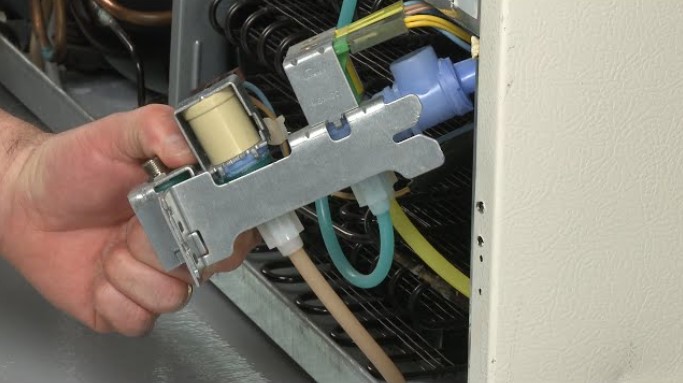
Preventive Measures And Maintenance Tips
Is your refrigerator water flowing out slowly? Discover preventive measures and maintenance tips to address this issue and maintain an efficient water system in your refrigerator.
Refrigerator water flow issues can be frustrating and inconvenient. If you find that your refrigerator water is coming out slowly, there are several preventive measures and maintenance tips you can follow to resolve the issue.
By taking these steps, you can ensure a consistent and sufficient water flow for your hydration needs.
Below are some helpful recommendations:
Regularly Clean The Water Filter
- Clean the water filter every six months or as recommended by the manufacturer.
- Remove the filter and gently rinse it under running water to remove any debris or sediment.
- Avoid using any harsh cleaning agents that may damage the filter.
- Once cleaned, reinstall the filter in the refrigerator.
Maintain Proper Water Pressure
- Check the water supply line connected to your refrigerator for any kinks or blockages.
- Ensure that the water valve is fully open to optimize water flow.
- Consider installing a water pressure regulator if the pressure is too high, as excessive pressure can affect water flow.
Keep The Refrigerator’S Temperature Consistent
- Maintain a proper temperature setting for your refrigerator to prevent freezing the water line.
- Follow the manufacturer’s recommended temperature guidelines.
- Ensure that the refrigerator door seals are intact and in good condition, as damaged seals can result in temperature fluctuations.
Schedule Professional Maintenance
- Arrange regular professional maintenance for your refrigerator to identify and resolve any potential issues.
- Professional technicians can inspect and clean the internal components of the refrigerator, including the water line and filter.
- They can also address any mechanical problems that may be affecting water flow.
By following these preventive measures and maintenance tips, you can improve the water flow in your refrigerator and enjoy refreshing, fast-flowing water whenever you need it.
Remember to adhere to the manufacturer’s recommendations and seek professional assistance when necessary to ensure the optimal functioning of your refrigerator’s water dispenser system.
GE refrigerator slow water flow
There are a few reasons why your GE refrigerator might be dispensing water slowly. Here are some things you can check:
- Water filter: A clogged water filter is one of the most common causes of slow water flow from a refrigerator dispenser. GE recommends replacing the water filter every 6 months, or more often if you have hard water. To check if the filter is clogged, remove it and install the bypass plug. If the water flow improves, the filter needs to be replaced.
- Kinked water line: The water line that connects the refrigerator to your water supply may be kinked, restricting the flow of water. Check the water line behind the refrigerator to make sure it is not kinked or twisted.
- Low water pressure: If your water pressure is too low, it can cause the refrigerator dispenser to flow slowly. You can check your water pressure by using a water pressure gauge. If the water pressure is below 40 psi, you may need to contact your water company or a plumber to have it increased.
- Clogged water valve: The water valve that controls the flow of water to the dispenser may be clogged with sediment or debris. To clean the water valve, remove it and soak it in a vinegar solution for 30 minutes. Then, rinse the valve with clean water and reinstall it.
- Problem with the dispenser: If you have checked all of the above and the water dispenser is still flowing slowly, there may be a problem with the dispenser itself. In this case, you will need to contact a GE appliance repair technician.
Here are some additional troubleshooting tips for a GE refrigerator with slow water flow:
- Purge the water tank: If your refrigerator has a water tank, try purging it to remove any trapped air that may be causing the slow flow. To purge the water tank, hold down the dispenser cradle for 2-3 minutes.
- Check the saddle valve: The saddle valve is the valve that connects the refrigerator’s water line to your water supply. If the saddle valve is not fully open, it can restrict the flow of water. Make sure that the saddle valve is turned on all the way.
- Clean the dispenser spout: The dispenser spout can become clogged with sediment or debris, which can slow the flow of water. Clean the dispenser spout with a mild soap and water solution. You can also use a toothbrush to remove any stubborn debris.
If you have tried all of the above troubleshooting tips and your GE refrigerator is still dispensing water slowly, you may need to contact a GE appliance repair technician for assistance.
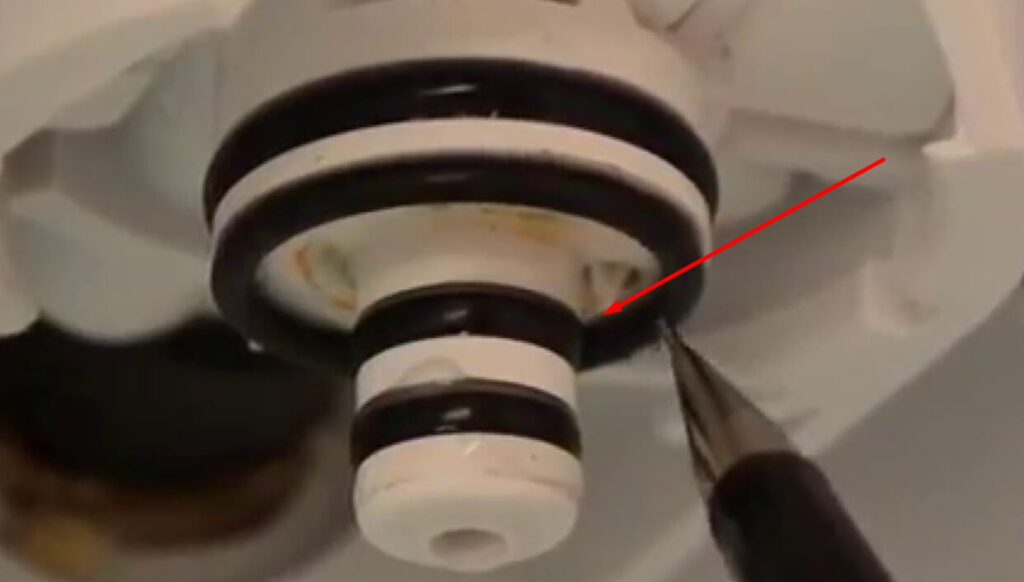
FAQs: Why Does My Refrigerator Water Come Out Slow?
Why Is My Fridge Water Extremely Slow?
There could be several reasons why your fridge water is extremely slow:
1. Clogged water filter: a dirty filter can restrict water flow, resulting in slow dispensing. Replace the filter regularly.
2. Low water supply: check if the water supply line is connected properly and the valve is fully open. Insufficient water pressure can cause slow flow.
3. Frozen water line: if the water line leading to the fridge is frozen, it can impede water flow. Defrost the line to restore normal water flow.
4. Faulty water inlet valve: a malfunctioning valve can restrict water flow to the fridge. Consider replacing the valve if necessary.
5. Kinked water line: check for any bends or kinks in the water line that may be restricting water flow. Straighten out any kinks to improve water flow.
Addressing these issues should help resolve the problem of slow-flowing water from your fridge.
Why Is The Filtered Water From My Fridge So Slow?
The slow water flow from your fridge filter may be due to a clogged filter or low water pressure. Check if the filter needs to be replaced or cleaned. You can remove and rinse it, or follow the manufacturer’s instructions.
Another possible cause is a blocked water supply valve. Ensure the valve is fully open. Low water pressure can also result from a partially closed shut-off valve under the sink. Make sure it is fully open as well. Additionally, if your fridge is not connected to a cold water line, it may take longer for the water to filter through.
Confirm that the water supply line is properly connected and not kinked. If these tips don’t resolve the issue, consult the fridge’s user manual or contact a professional for assistance. Keep in mind that regular maintenance is important to ensure optimal performance.
How Do I Increase Water Flow To My Refrigerator?
To increase water flow to your refrigerator, you can follow these simple steps:
1. Check the water supply: ensure that the water supply is connected properly and the valve is fully open.
2. Clean the water filter: a clogged water filter can restrict water flow. Remove and clean the filter according to the manufacturer’s instructions.
3. Inspect the water line: check for any kinks or bends in the water supply line. Straighten or replace it if necessary.
4. Adjust the water pressure: if the water pressure is too low, adjust the main water valve to increase the pressure.
5. Defrost the freezer: if the freezer is iced up, it can affect the water flow. Thaw the freezer by turning off the refrigerator and allowing it to defrost.
6. Replace the water inlet valve: If none of the above steps solve the issue, there may be a problem with the water inlet valve.
It is recommended to consult a professional technician to replace it. Remember, regular maintenance and cleaning can help maintain optimum water flow to your refrigerator.
Why Is My Water Dispensing Slowly After Filter Change?
After changing the water filter, your water dispenser may be dispensing slowly due to an airlock. To resolve this issue, try the following steps:
First, remove the water filter cartridge and check if it is inserted correctly. Next, purge the air by running the dispenser without the filter for a few seconds.
Then, reinstall the filter cartridge and make sure it is securely in place. If the problem persists, the issue might be with a clogged filter or a faulty dispenser valve. In such cases, clean or replace the filter and contact the manufacturer for further assistance.
It is essential to follow proper maintenance procedures and replace filters regularly to ensure the optimal performance of your water dispenser. Remember to always refer to the manufacturer’s instructions.
Conclusion
To wrap up, a slow water flow from your refrigerator can be a frustrating issue, but understanding the potential causes is the first step toward finding a solution. By checking the water supply line, filter, and water pressure, you can address any clogs or obstructions that may be hindering the flow.
Additionally, keeping the refrigerator coils clean and ensuring proper temperature settings can also optimize water flow. Regular maintenance and replacing filters as recommended can prevent future problems. If all else fails, enlisting the help of a professional technician can provide the expertise needed to diagnose and resolve more complex issues.
Remember, maintaining a constant and adequate water flow to your refrigerator will not only ensure convenient access to chilled water and ice but also extend the lifespan of your appliance.
